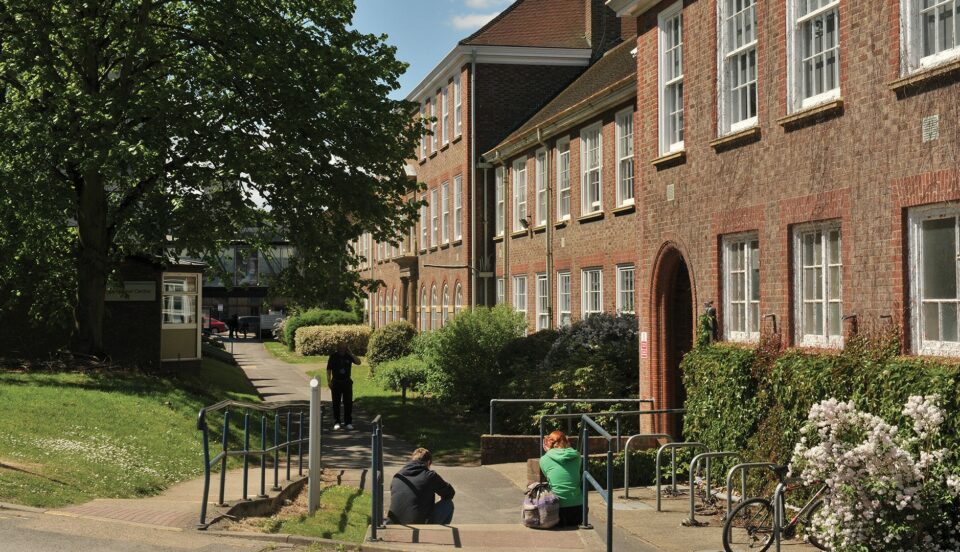T Levels are two-year, technical study programmes, designed with employers to give you the skills industry needs.
You take just one T Level – Which is equivalent to three A Levels.
Unlike A Levels, T Levels provide:
- technical knowledge and skills specific to your preferred career
- an industry placement of at least 45 days
- Maths, English and digital skills
- common workplace skills.
The course covers all aspects of working in the health sector and combines a mix of college-based study, training in simulated environments, work experience in your first year and a 45-day Hospital Industry Placement in your second year, alongside mandatory training within the hospital setting.
The T level qualification is designed with occupational specialisms in mind specific to clinical care, unlike the BTEC Diploma in Health care which is a more generalised qualification. The T level qualification is very much for those that already know that they would like to pursue a pathway in clinical health.
If your interest is to follow a Social career pathway please look at the Health and Social Care: Social Level Care 3 course.
Your Industry placement will help you to gain valuable practical experience to support you in your career goals.
The hospitals supporting this pathway and hosting industry placements are:
BERKSHIRE HEALTHCARE NHS FOUNDATION TRUST
FRIMLEY HEALTH NHS FOUNDATION TRUST
ROYAL BERKSHIRE NHS FOUNDATION TRUST
OXFORD UNIVERSITY HOSPITALS NHS TRUST
ROYAL SURREY NHS FOUNDATION TRUST
The roles you could progress to are:
- Nursing Associate Trainee (Level 5 Apprenticeship)
- Roles leading to nursing degrees
- Therapy Assistant
- Operating Department Practitioner (ODP)
- Pharmacy Technician
- Medical Support Worker
- Play Specialist
- Paramedic
- Biomedical Science Apprentice with Pathway to Oxford Brookes Biomedical Science Degree (Oxford University Hospitals only)
This qualification is equivalent to three A Levels and gives you a number of other benefits, including:
- A study programmes, which has been co- designed with employers to give you the skills industry needs.
- on-the-job experience putting you in the best place possible to progress into work
- a variety of experiences so you can better identify the area in which you want to specialise
- you will graduate with the qualifications to progress to universityor employment
- an industry-developed curriculum which is practical, not theoretical
- a T Level qualification which will earn you the UCAS points needed for university entry
Successfully complete this course and you’ll have the UCAS Tariff points required to progress to higher education (degree-level) qualifications.
This course is for students aged 16-18. All applicants will be invited to attend an interview to meet a tutor and ask any questions they may have about the course
What you'll learn
As well as the core components of the T level qualification, students will also be taught occupational specialisms relevant to clinical care and practice. This will allow you to learn the knowledge and skills that are needed to achieve competency to complete the course successfully.
Maths, English and digital skills will be integrated within the qualification and will be applied in occupationally relevant context.
Behaviors that are also important for employability will also be integrated within the course content.
An employer set project also makes up part of the T Level qualification.
You will also have set sessions with a progress coach who will support you to develop your attributes and will help you to become an independent learner.
How you'll learn and be assessed
This is a two-year programme that includes a minimum of 45 days industry placement.
The purpose of these placements is two-fold:
- You gain practical, real-life experience of working in your desired profession and gain practical, hands-on knowledge to help you graduate from the programme
- You build relationships with potential colleagues and employers; it helps you get your foot in the door at your desired workplace
The Core part of the T Level qualification will be assessed through an external examination and a substantial employer set project.
Occupational specialisms will be assessed synoptically through rigorous practical assignments, as well as building up a portfolio of assessed competencys.
Industry placements in health settings are essential to the course and provide valuable links between theory and practice
Entry requirements
You need to have 5 GCSEs at grade 4 or above, including English language and maths. You will require science at grade 5.
